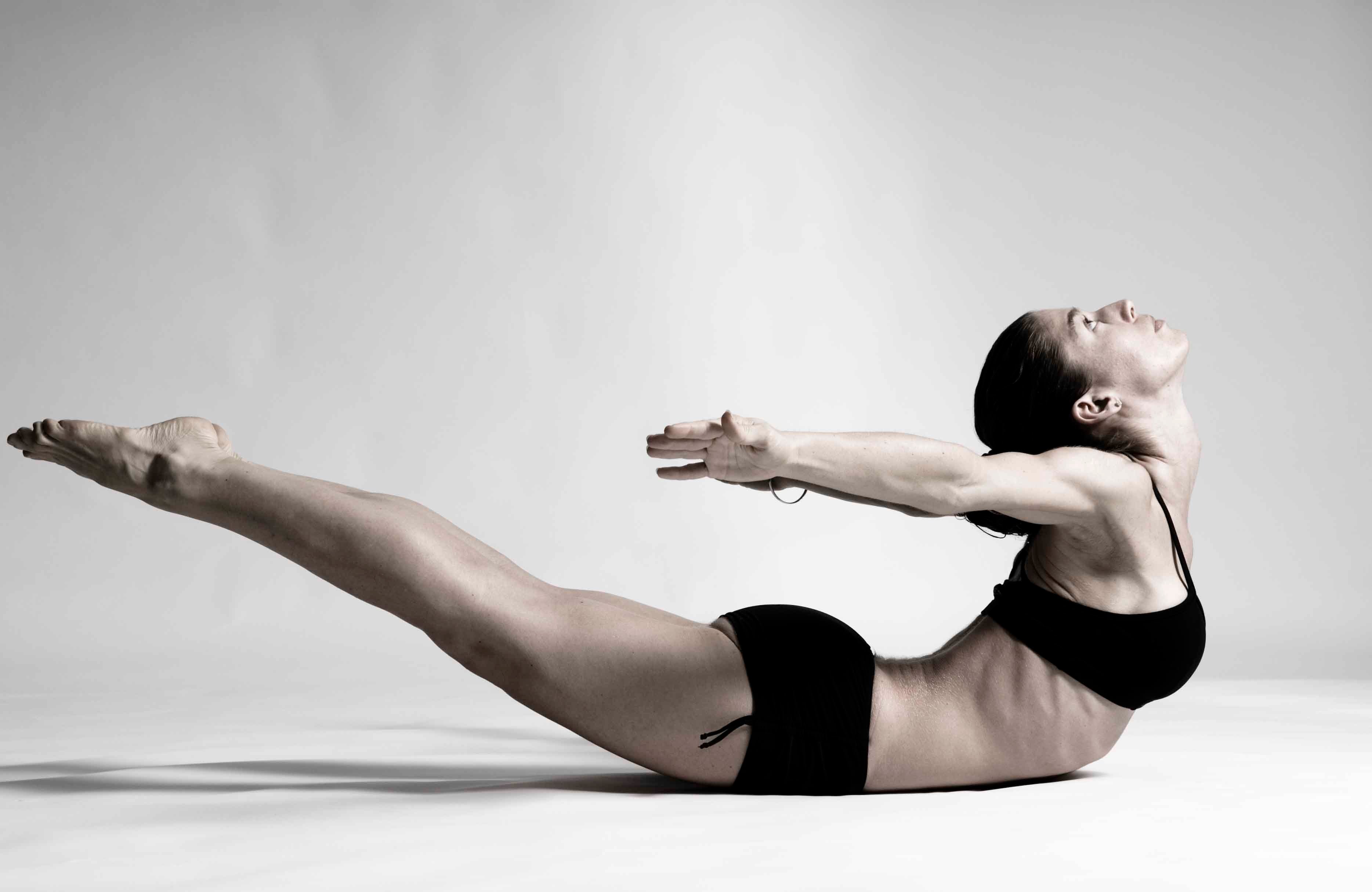Thanks for interest in my first blog and AMA: @daut44/introduction-and-ama-ask-me-anything-about-being-a-professional-poker-and-daily-fantasy-sports-player-cross-post-from-poker
Will run another AMA next week with poker and DFS players invited from other forums to participate, I would love to grow the following for poker and DFS here and to help bring brilliant and interesting people to Steem.
In 2006-2011, it was very easy to make big money in poker. Once my process and understanding reached a certain level, my work ethic and motivation to improve dropped considerably. I just had to make sure to play a moderate amount of hours a week, but I had difficulty focusing while playing, had trouble playing long sessions, stopped putting in work off the table (studying), and relied on my built up knowledge to continue my success. I found myself watching movies/shows on netflix and autopiloting (playing robotic rather than engaging my brain for each decision), and my growth as a player stopped. Over time, players caught up to my level of understanding and poker started getting very hard for me. The bad habits I built up for years were directly causing my profits to decrease each year after 2012.
I transitioned over to DFS (daily fantasy sports) at the end of 2014, and it consumed my life. I watched every relevant game, sweated how players/teams were doing, spent a few hours registering for contests and scouring the lobbies, and many more hours working on lineups each day. My process wasn't aimed to be efficient, DFS just took up 10+ hours of my days and it was the only thing I could focus on: despite my work ethic returning, as my obsession grew and my profits increased, I was having trouble focusing on other areas of life. For instance I couldn't sit down and read a book without stopping every other page to check twitter for news, check espn, or check things on the DFS sites. I couldn't get in a decent workout because halfway in I would have an epiphany or realization, run home and get back to work. I couldn't even get minor tasks crossed off a to do list because DFS always came first. My obsession destroyed my productivity in other areas of life.
Morning Routine
I listened to a Tim Ferriss podcast, best selling author of books such as The 4 hour Work Week and The 4 Hour Body and famed tinkerer and minimalist, where he detailed his desired morning routine to get his day started off right. Link if you want to listen: http://fourhourworkweek.com/2015/09/18/5-morning-rituals/
His intended routine:
-make bed
-tea
-journaling
-meditation
-hang off pull up bar
Of course life or obligations sometimes get in the way and the entire routine is hard for him to fully complete, but if he can complete at least 3 parts he feels that he is ready to "win the day”.
After tinkering with his suggestions and some additions of my own, I've landed on a method that maximizes my productivity throughout the day in a much shorter amount of time.
Make Bed
I copied this one directly from Tim. Every morning I wake up and quickly tidy up by sheets and blanket. Since I work from home, this reduces distraction from seeing a messy bed, takes less than a minute, and starts my day off with a win.
Stretching
I initially started meditating each morning, mostly through guided meditation from an app called Headspace, where a British man named Andy Puddicombe who was a former Buddhist monk guides you through 10 minute meditative sessions. Most people think meditation is about thinking of nothing, but the way Andy describes it, picture a congested roadway, with thoughts driving down one side of the road and feelings driving down the other. Don't try to stop the thoughts and feelings from happening, but rather try and remove yourself from them, placing yourself on the side of the road as an observer watching them pass and noting them. And every time your mind starts to wander or drift with thoughts or feelings, center yourself by returning your focus to your breathing. The app is helpful for many people, I felt improvement, and if you have problems compartmentalizing, focusing, or with anxiety I highly recommend trying it.
But I stopped meditating each morning and decided to pursue stretching instead. I play a few sports recreationally (rock climbing and Brazilian Jiu Jitsu), and although I am not a gifted athlete overall, flexibility and balance are still among my worst athletic traits, but are vital skills for both sports. I figured adding a stretch each morning to try and incrementally improve my flexibility so I would see results in my various activities. After a few months of stretching, I've seen little to no gain in my overall flexibility, but I started seeing the same meditative benefits that I got from Headspace and there were additional recuperative and injury recovery affects for my body.
My routine is a combination of things I picked up from sports and in Yoga classes:
30 second front leg stretch.

5 ankle rotations, each foot, each direction (20 total). I lift a foot off the ground, do 5 full 360 degree rotations, then do 5 in the other direction, then do this for the other foot.

While standing, lift knee to chest, hold position with gradual increased pressure over 15 seconds.
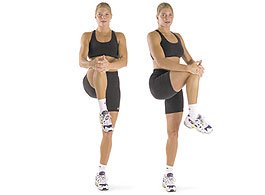
Follow up stretch: Do 5 circular rotations for each leg. Leg starts down, lift knee to chest, swing knee as far outside (with leg bent) as you can, then circle back down and restart. Then rotate other direction 5 times, then repeat for other leg. 20 total rotations.
Front bend forward, try to touch toes, hold for 30 seconds

Follow up stretch is a back bend to do the negative or reverse version. Gradually increase bend over 10-15 seconds
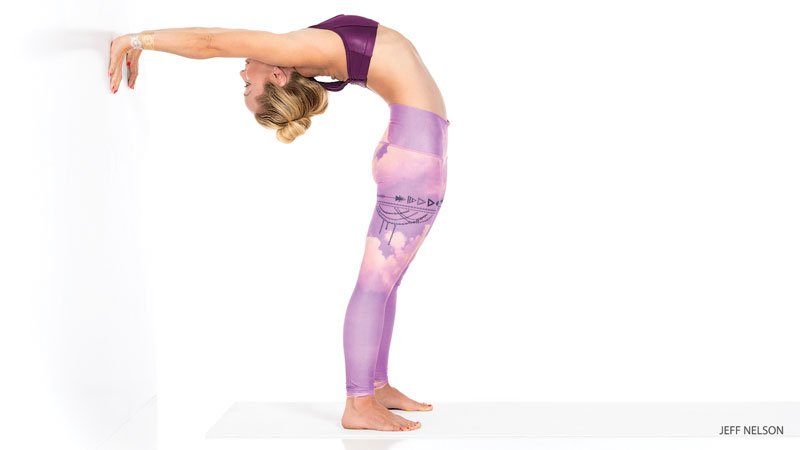
30 seconds butterfly stretch
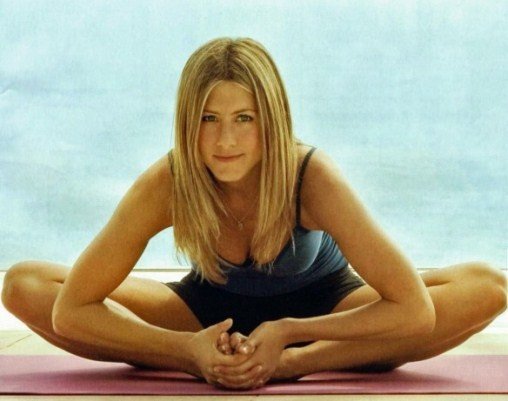
Seated version of the front bet forward, touch toes, gradually increase pressure for 15 seconds

Spread legs, touch ankles, gradually increase stretch for 15 seconds
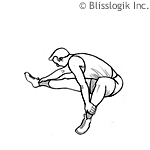
Leg over body, lay flat on floor, hold for 30 seconds each leg
With legs straight in front of you, cross right foot over left knee, then twist your left elbow across right knee and look behind you, gradually increasing the stretch over 30 seconds. Repeat left leg.
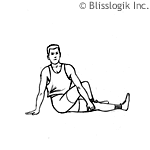
Locust pose, hold for as long as is comfortable:
Shoulder rolls, 5 each direction:
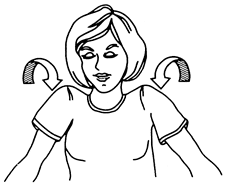
Hold the following for 10 seconds each arm:

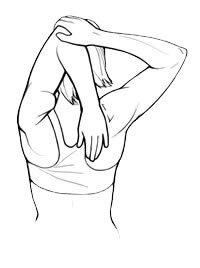
Neck stretches: I nod my head yes 10 times, then nod my head no 10 times, then stretch my head so that my ear goes to my shoulder 10 times.

Then I do a power pose where I stand like this for 30 seconds:

A TED talk I watched back in the day claimed it showed bursts of increased testosterone, and also works as a great last stretch to open up your back.
The whole routine takes roughly 10-12 minutes total, but I feel great afterwards. It hits basically every body part and I feel much less soreness and body pain in my day to day life.
Scrambled Eggs and multivitamins
For the past year I experimented with incorporating tea into my morning routine. Instead of increased focus, I tended to feel worse: some things aren’t for everyone. However, I’ve found eating a high fat/protein breakfast gives me energy without leaving me bloated like many heavier carbohydrate meals do. I basically scramble 4-6 eggs, take glucosamine to aid in physical recovery, and a multivitamin to fill any possible holes in my diet. Plus having protein after a workout (even if it’s only a 10-12 minute stretch) is always good for your muscles.
Cold Shower
Cryotherapy is becoming increasingly popular in the athletic world. Athletes enter a cylindrical chamber as liquid nitrogen cooled -300 degree farenheit air surrounds their body, producing a fight or flight response in their bodies that releases endorphins and adrenaline. This process can reduce recovery time to a fraction of what it would be otherwise.
I don’t have a cryotherapy freezer, and ice baths sound excruciating, but I hop in the shower and gradually lower the temperature til it’s as cold as possible. I’m not sure how much of a response my body has to this, but I always feel great immediately afterwards and am ready to start the day.
Staying Productive afterwards using the Pomodoro Method
This morning routine is much faster than Tim’s: it takes me roughly 30 minutes to complete all 4 parts, but once done I can get started on any tasks and feel focused for long periods into the day. After I generally try to break up my day into 30 minute blocks where I get certain things done and stay balanced. This is similar to the Pomodoro method (https://en.wikipedia.org/wiki/Pomodoro_Technique), where I do something for 30 minutes and then offer myself a small reward, either a snack or a stretch or a couple minutes to play with my phone.
Example daily schedule:
830am: wake up, feed+water dog
845-915: morning routine
915-930: preliminary DFS work and registration. Reward: banana (because bananas are fucking awesome)
930-1000: to do list (i.e. pay bills, clean apartment, return emails, etc)
1000-1030: longer dog walk (also reward for finishing to do list)
1030-11: astrophysics work or other classes I take recreationally check out the following 2 sites: https://www.edx.org/
https://www.coursera.org/
11am-2pm: Indoor bouldering, lunch, shower. (also the reward for reading/learning)
2-4: DFS work (breaks every 30 minutes to either eat, do a short stetch, or take dog on a short walk)
4-430: DFS Journaling, write down observations, mistakes, triumphs, and anything else I want to note
Combining the morning routine and 30 minute blocks afterwards with mini rewards after has reduced my procrastination issues and helped return balance in my life.
Pledge 40% of payouts to top 4 Commenters (10% each)
I like to promote intelligent discourse in the comment sections of my blogs[1, link to blog I wrote on this subject], so I pledge to transfer money received from the OP to top commenters. It's hard to go through and distribute it evenly amongst commenters, but I'll transfer back 40% of the payouts received to commenters on this blog.
So, in the comments leave any tips you have for productivity, any tips for a morning routine, or anything you disagree with or think you can improve. It's all part of the learning process.
[1]: a previous blog I wrote on this subject: @daut44/steemit-needs-to-change-its-reward-system-to-better-incentivize-intelligent-discourse-in-blogs


